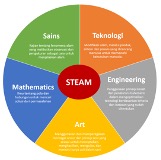Primary school teachers’ awareness on STEAM learning: A starting point to develop STEAM-CB textbook
DOI:
https://doi.org/10.12928/bamme.v2i1.5565Keywords:
Character building, Primary school teacher, STEAM learningAbstract
STEAM learning is an approach which integrates multidisciplinary knowledge while enriching students' skills to explore, try, ask, find, and build innovation, namely science, technology, engineering, art, and mathematics. We found that the learning resources of STEAM in Yogyakarta is very limited due to lack of knowledge about it. On the other hand, using local contexts as the starting point of learning is also important to foster character building. This preliminary research aims to provide insight on the teachers’ awareness on STEAM learning and textbook, as well as the design we figured out after discussing it with the teachers. It was a descriptive qualitative research involving 214 primary school teachers. We collected the data through questionnaire and focus group discussion. The results suggest that STEAM is quite a new concept for most of primary school teachers in Yogyakarta. Not many teachers used to or have developed the STEAM learning resources, especially the one integrated with the character building. Therefore, a STEAM textbook needs to be developed to fulfill the need. Furthermore, the design of the textbook could have the characteristics of integrating all components of STEAM (science, technology, engineering, art, mathematics), starting from local context to develop characters, improving creative and critical thinking, having knowledge and skill assessment, and using project-based learning model.
References
Arlinwibowo, J., Kartowagiran, B., Retnawati, H. (2020). Model Penilaian Capaian Belajar Matematika dengan Framework STEM. Yogyakarta: UNY Press.
Azizah, N., Putri, S. U., & Adjie, N. (2020). STEAM berbantuan augmented reality untuk mengembangkan kemampuan bahasa pada anak usia 5-6 tahun. Research in Early Childhood Education and Parenting, 1(1), 32-42.
Dejarnette, N. K. (2018). Implementing STEAM in the Early Childhood Classroom. European Journal of STEM Education, 3(3), 18.
Djono, D., Utomo, T. P., & Subiyantoro, S. (2012). Nilai Kearifan Lokal Rumah Tradisional Jawa. Jurnal Humaniora, 24(3), 269-278.
Fajrina, M. N., Antariksa, A., & Ridjal, A. M. (2017). Pola Ruang Dalam pada Rumah Tinggal Tradisional Jawa di Desa Brayut, Yogyakarta. Jurnal Mahasiswa Jurusan Arsitektur, 5(1).
Fitriyah, A., & Ramadani, S. D. (2021). Pengaruh Pembelajaran STEAM Berbasis PJBL (Project-Based Learning) terhadap Keterampilan Berpikir Kreatif dan Berpikir Kritis. Jurnal Inspiratif Pendidikan, 10(1), 209-226.
Istihapsari, V., Istiandaru, A., & Rohmah, S. N. (2019). Analisis Kurikulum Matematika SLTA. Yogyakarta: UAD Press.
Kemdikbud. (2016). Peraturan Menteri Pendidikan dan Kebudayaan Nomor 22 Tahun 2016 tentang Standar Proses. Jakarta: Kementerian Pendidikan dan Kebudayaan RI.
Kim, D. J., Bae, S. C., Choi, S. H., Kim, H. J., & Lim, W. (2019). Creative character education in mathematics for prospective teachers. Sustainability, 11(6), 1730.
Kurniawan, M. R. (2018). Permainan tradisional Yogyakarta sebagai sumber belajar alternatif berbasis kearifan lokal bagi pembelajaran di sekolah dasar. Premiere Educandum: Jurnal Pendidikan Dasar dan Pembelajaran, 8(2), 98-111.
Muhtadi, A. (2020). Modul 3 Pendalaman Materi Pendidikan Profesi Guru: Pembelajaran Inovatif. Jakarta: P3GTK Kemdikbud RI.
Mustaghfiroh, S. (2020). Konsep “merdeka belajar” perspektif aliran progresivisme John Dewey. Jurnal Studi Guru dan Pembelajaran, 3(1), 141-147.
Park, H., Byun, S. Y., Sim, J., Han, H. S., & Baek, Y. S. (2016). Teachers’ perceptions and practices of STEAM education in South Korea. Eurasia Journal of Mathematics, Science and Technology Education, 12(7), 1739-1753.
Prahmana, R. C. I., & Istiandaru, A. (2021). Learning sets theory using shadow puppet: A study of Javanese ethnomathematics. Mathematics, 9(22), 2938.
Rachmadyanti, P. (2017). Penguatan pendidikan karakter bagi siswa sekolah dasar melalui kearifan lokal. JPSD (Jurnal Pendidikan Sekolah Dasar), 3(2), 201-214.
Suyitno, H., Zaenuri, Sugiharti, E., Suyitno, A., & Baba, T. (2019). Integration of Character Values in Teaching-Learning Process of Mathematics at Elementary School of Japan. International Journal of Instruction, 12(3), 781-794.
Suyitno, H., & Suyitno, A. (2018). Building innovative and creative character through mathematics. AIP Conference Proceedings, 1941, 020042.
Yamin, M., & Syahrir, S. (2020). Pembangunan pendidikan merdeka belajar (telaah metode pembelajaran). Jurnal Ilmiah Mandala Education, 6(1), 126-136.

Downloads
Published
Issue
Section
License
Copyright (c) 2022 Uswatun Khasanah, Afit Istiandaru, Dwi Astuti, Mazlini Adnan, Martyana Prihaswati

This work is licensed under a Creative Commons Attribution-ShareAlike 4.0 International License.
Authors who publish with this journal agree to the following terms:
- Authors retain copyright and grant the journal right of first publication with the work simultaneously licensed under Creative Commons Attribution License that allows others to share the work with an acknowledgement of the work's authorship and initial publication in this journal.
- Authors are able to enter into separate, additional contractual arrangements for the non-exclusive distribution of the journal's published version of the work (e.g., post it to an institutional repository or publish it in a book), with an acknowledgement of its initial publication in this journal.
- Authors are permitted and encouraged to post their work online (e.g., in institutional repositories or on their website) prior to and during the submission process, as it can lead to productive exchanges, as well as earlier and greater citation of published work (See The Effect of Open Access).



